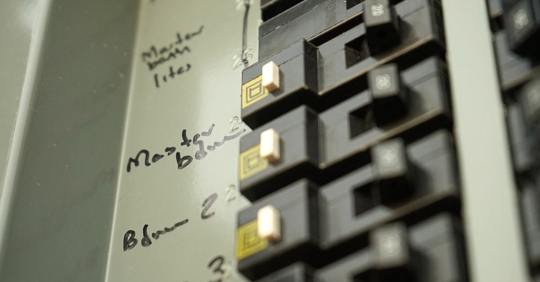Fuse boxes are a big part of safely powering your home. A blown fuse reduces the risk of damage from electrical surges or overload and keeps unaffected circuits working. If it’s been a while since you’ve had to change a blown fuse, here’s a refresher and some insight on upgrading to a safer, more reliable option.
What Does a Fuse Do?
Electrical fuses automatically turn off the power when there is a problem. The fuse includes thin metal filaments that burn out or blow to reduce the risk of fire or additional circuits being affected. There are three main reasons a fuse might blow.
- Electrical overload – Older fuse boxes can’t handle as much amperage as circuit breaker panels. When a circuit carries too much power, it overheats and blows. This usually happens when households are running too many appliances, have added additional lighting, or are charging too many devices.
- Faulty appliances – Households appliances with bad wiring, loose connections, or that are malfunctioning can cause electrical imbalances that impact electrical needs. If the same fuse continues to blow, locate which appliances may be on that circuit.
- Short circuit – When one circuit contacts another, it’s called a short circuit. This is a serious fire hazard and can pose a risk to anyone who may come in contact with the affected wiring or appliances that may be connected.
You can always count on emergency residential electrical service when the power is out.
Replacing a Fuse in a Fuse Box, Step-by-Step
Follow these steps to safely fix a blown fuse and restore power to affected parts of your home. Always take care when working with any electrical components and give yourself plenty of time to follow these tips.
If you have any concerns about touching your fuse box or any electrical componentry, leave it to a trained professional. Call us today for friendly assistance.
- Turn off all electrical devices in the affected area of your home. This includes turning light switches to the off position, even if the lights are out. This reduces the risk of overloading the fuse again.
- Turn off the power at the fuse box. This will completely cut off power to all fuses so expect your home to go dark.
- Find the blown fuse. You can usually spot blown fuses by locating a discolored fuse or a melted piece of metal. If your fuse box is labeled, you may be able to narrow down the fuses based on what part of your home lost power.
- Remove the blown fuse. Unscrew the damaged fuse and replace it with a fuse of the exact same size, amperage, and type.
- Screw in the fuse in the same location.
- Restore power to the fuse box by flipping the main power switch.
Do Fuse Boxes Need to Be Replaced?
If your home has a fuse box, it’s almost certainly more than 50 years old. Over time, fuses and circuits wear out and increase the risk of fire or causing damage to wiring or appliances. To reduce these safety concerns, you can replace a fuse box with a circuit breaker panel.
Why the Cost to Replace a Fuse Box with a Breaker Panel is Worth It
Upgrading from a fuse box to a circuit breaker panel costs between $1,400 and $4,000. The cost varies based on your amperage needs and the extent to which your home’s wiring needs to be replaced. There are two main benefits to making the switch:
- Improved safety – Modern circuit breakers trip faster than fuses, which reduces the risk of fire or personal injury.
- Increased load – Circuits also carry higher amperages than fuses to accommodate modern electrical needs, including more appliances and charging electrical devices.
Power Your Home Safely with a Modern Circuit Breaker Panel
When you’re tired of replacing fuses, call C.M. Mose & Son. For over 60 years, we’ve helped families in the Kansas City area stay comfortable with professional electrical, HVAC, and power generation needs. Contact us online or call us at (816) 339-5190 to learn more about circuit panel installation services.

